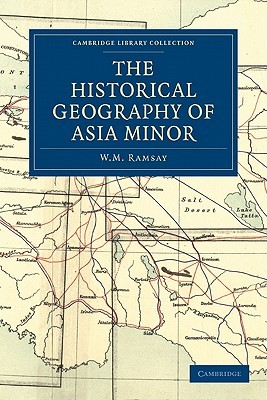
- We will send in 10–14 business days.
- Author: W M Ramsay
- Publisher: Cambridge University Press
- ISBN-10: 1108014534
- ISBN-13: 9781108014533
- Format: 15.2 x 22.9 x 3.3 cm, minkšti viršeliai
- Language: English
- SAVE -10% with code: EXTRA
Reviews
Description
The archaeologist and New Testament scholar William Mitchell Ramsay (1851-1939) first published The Historical Geography of Asia Minor in 1890, pioneering the study of classical topography. The book, based on his extensive fieldwork, is split into two parts. Part 1 examines the trade routes and road systems - both Roman and Byzantine - of Asia Minor. It discusses Hellenism and Orientalism and assesses the reliability of ancient topographical accounts of the area, including the Peutinger Table, the itineraries and a number of Ptolemy's geographical comments. Part 2 examines the political divisions of Asia Minor into cities and bishoprics. A number of maps and tables are included. Ramsay's authoritative survey opened up the historical study of the geography and topography of Asia Minor in many disciplines. His work has been used widely by archaeologists, classicists, and New Testament scholars. Still not fully superseded, it remains a key text in historical geography.
EXTRA 10 % discount with code: EXTRA
The promotion ends in 23d.06:03:48
The discount code is valid when purchasing from 10 €. Discounts do not stack.
- Author: W M Ramsay
- Publisher: Cambridge University Press
- ISBN-10: 1108014534
- ISBN-13: 9781108014533
- Format: 15.2 x 22.9 x 3.3 cm, minkšti viršeliai
- Language: English English
The archaeologist and New Testament scholar William Mitchell Ramsay (1851-1939) first published The Historical Geography of Asia Minor in 1890, pioneering the study of classical topography. The book, based on his extensive fieldwork, is split into two parts. Part 1 examines the trade routes and road systems - both Roman and Byzantine - of Asia Minor. It discusses Hellenism and Orientalism and assesses the reliability of ancient topographical accounts of the area, including the Peutinger Table, the itineraries and a number of Ptolemy's geographical comments. Part 2 examines the political divisions of Asia Minor into cities and bishoprics. A number of maps and tables are included. Ramsay's authoritative survey opened up the historical study of the geography and topography of Asia Minor in many disciplines. His work has been used widely by archaeologists, classicists, and New Testament scholars. Still not fully superseded, it remains a key text in historical geography.


Reviews